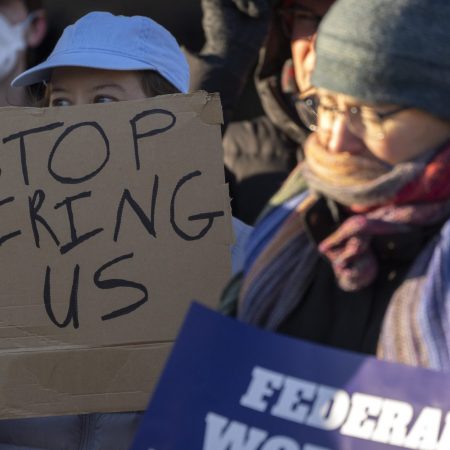The Senate passed a resolution Wednesday night that would thwart President Donald Trumps ability to impose tariffs on Canada, delivering a rare rebuke to the president just hours after he unveiled sweeping plans to clamp down on international trade.
The Senate resolution, passed by a 51-48 vote tally with four Republicans and all Democrats in support, would end Trumps emergency declaration on fentanyl trafficking that underpins tariffs on Canada. Trump earlier Wednesday announced orders his so-called Liberation Day to impose import taxes on a slew of international trading partners, though Canadian imports for now were spared from new taxes.
The Senates legislation has practically no chance of passing the Republican-controlled House and being signed by Trump, but it showed the limits of Republican support for Trumps vision of remaking the U.S. economy by restricting free trade. Many economists are warning that the plan could cause an economic contraction, and GOP senators are already watching with unease as Trump upends the United States relationship with the rest of the world.
Trump earlier Wednesday singled out the four Republicans Sens. Lisa Murkowski of Alaska, Susan Collins of Maine, Mitch McConnell of Kentucky and Rand Paul of Kentucky who voted in favor of the resolution.
In a statement following the vote, McConnell, the former Senate Republican leader, said, As I have always warned, tariffs are bad policy, and trade wars with our partners hurt working people most.
To justify the tariffs, Trump has argued that Canada is not doing enough to stop illegal drugs from entering the northern border. Customs and Border Protection seized 43 pounds of fentanyl in its northern border sector during the 2024 fiscal year, and since January, authorities have seized less than 1.5 pounds, according to federal data. Meanwhile, at the southern border, authorities seized over 21,000 pounds last year.
This is not about fentanyl. Its about tariffs. Its about a national sales tax on American families, said Sen. Tim Kaine, the Virginia Democrat who initiated the resolution, at a news conference Wednesday.
RELATED STORY | Trump announces baseline 10% tariff on imports for all US trade partners
Democrats argued that Trump is using the tariffs to pay for proposed tax cuts that would benefit the wealthy, but will also make it more expensive to build homes, buy cars and pay for imported grocery products. Kaine pointed to aluminum imported from Canada that is used by businesses ranging from pie makers to shipbuilders.
Today, Donald Trump takes a sledgehammer to the American economy and even to the American dream, Senate Democratic leader Chuck Schumer said in a floor speech.
On the heels of election results in Wisconsin and Florida that delivered early warning signs to Republicans about the popularity of Trump's agenda, Schumer said that the president is particularly vulnerable when it comes to the economy.
Once the American people say, I dont want to embrace somebody, I dont want to vote for somebody, I dont want to support somebody who embraces Trumps policies, things are going to change," he told reporters. Public sentiment is everything."
At the White House on Wednesday, Trump singled out Canada as a beneficiary of unfair trading practices with the U.S., though his latest order did not add to tariffs already in place on Canada and Mexico.
Why are we doing this? I mean, at what point do we say, Youve got to work for yourselves and youve got to? This is why we have the big deficits," Trump said.
For their part, Republican leaders tried to hold their members in line not by talking about the impacts of tariffs, but by emphasizing that Trump was acting to address fentanyl trafficking and border security.
Majority Whip Sen. John Barrasso argued in a floor speech that former President Joe Biden had also thrown open the northern border. The criminal cartels noticed and they took advantage.
"There are unique threats to the United States at our northern border," the Wyoming senator said. President Trump is taking the bold, decisive, swift action that is necessary to secure that border as well.
Republicans lined up on the Senate floor Wednesday afternoon to underscore the need to act to halt fentanyl trafficking, including at the northern border. However, it was not enough to persuade a key group of Senate Republicans who objected to the tax on Canadian imports.
In a floor speech Wednesday, Collins said she would support the resolution and noted, The fact is the vast majority of fentanyl in America comes from the southern border.
Collins said that Canada is already beefing up border security to address drug trafficking, yet she was concerned about what tariffs would do to businesses and households in Maine. She pointed to a paper mill in her home state that pumps paper pulp from Canada.
A tariff placed on this pulp would jeopardize the financial wellbeing of this vital paper mill, which employs more than 500 people in rural, northern Maine. There is not another big employer in that area that can possibly compensate for the loss of those 510 direct jobs, Collins said.
Paul, a Kentucky Republican who often supports libertarian economic views, also delivered an impassioned floor speech, arguing that the president should not be given unilateral authority to impose taxes on imports.
Every dollar collected in tariff revenue comes straight out of the pockets of American consumers, he said. Conservatives used to understand that tariffs are taxes on the American people. Conservatives used to be uniformly opposed to raising taxes because we wanted the private marketplace, the private individuals to keep more of their income.
While a younger group of Republicans closely aligned with Trump has spoken out in favor of the president's plans to aggressively reshape the economy, a sizable portion of the Republican Conference voiced concerns about the tariff impacts on farmers and other industries. Still, most wanted to give Trump room in hopes that he would negotiate better trade deals.
North Dakota Sen. Kevin Cramer said that he has been in constant talks with both Canadian officials and businesses in his state, like Bobcat, which does a significant amount of its sales in Canada. He voted against the resolution. Instead, he hoped that Trump's order would just be a starting point for negotiations to mutually drop tariffs.
The Republican added: Im not overly concerned about it, but obviously it occupies a lot of attention and time and a lot of political anxiety."
Democrats planned to keep pressing into that anxiety. After Trumps announcement, Rep. Gregory Meeks, the top Democrat on the House Foreign Affairs Committee, said on social media he would also force a similar vote in the House on the tariffs.
Republicans cant keep ducking this its time they show whether they support the economic pain Trump is inflicting on their constituents, he said.





















































